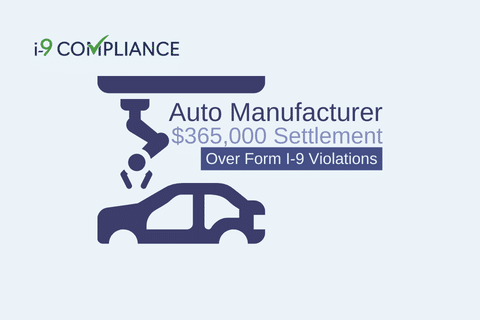Auto Manufacturer Reaches $365,000 Settlement Over Form I-9 Violations

April 25, 2023
One of the largest auto manufacturers in the U.S. has reached a settlement agreement with the Department of Justice (DOJ) concerning alleged Form I-9 violations. According to the DOJ’s determination, the employer discriminated against non-U.S. citizens. As such, the company violated the Immigration and Nationality Act (INA) by failing to properly consider the INA’s non-discrimination provisions when complying with export control laws.
Export control laws and regulations limit non-U.S. individuals’ access to certain export-controlled items. These regulations include the International Traffic in Arms Regulations and the Export Administration Regulations. Furthermore, the individuals seeking access must first acquire authorization from the U.S. government. These laws define a “U.S. person” as any U.S. citizen, U.S. national, lawful permanent resident, refugee, or asylee.
These laws also require employers to obtain approval to provide access to certain export-controlled items. They can receive permission from the State or Commerce Department to provide such access through non-U.S. employees. Furthermore, employers must confirm whether the individual qualifies as a U.S. person. Employers can do this via an “export compliance assessment,” which checks the worker’s proof of citizenship or immigration status.
According to the DOJ’s investigation, the employer merged its export compliance assessment process with the employment eligibility verification (Form I-9) process. This practice required job applicants to provide unnecessary documentation to prove their work authorization, violating regulations. The investigation also revealed that the employer maintained this practice until September 2021. Furthermore, the DOJ discovered a policy that violated 8 U.S.C. § 1324b(a)(1)(B). This policy adversely affected lawful permanent residents who had to provide an unexpired foreign passport to secure employment.
The INA prohibits employers from demanding more documentation than necessary as a condition of employment. They also cannot request specific documents to verify an individual’s authorization to work. Under federal law, workers may choose any combination of valid documentation to prove their permission to work. This standard remains true even in the face of export-control laws and regulations.
Under this settlement agreement, the employer will pay $365,000 in civil penalties to the United States, revise its policies, and train its personnel on the INA’s requirements. The company will also face additional departmental monitoring and reporting requirements.
As this case demonstrates, remaining compliant with Form I-9 requirements can prove challenging. The best way to stay compliant is to use electronic I-9 management software. This tool can help to navigate these regulations and ensure uniform compliance with every employee.
Automate your employment eligibility verification today with the ensured compliance of I-9 Compliance.